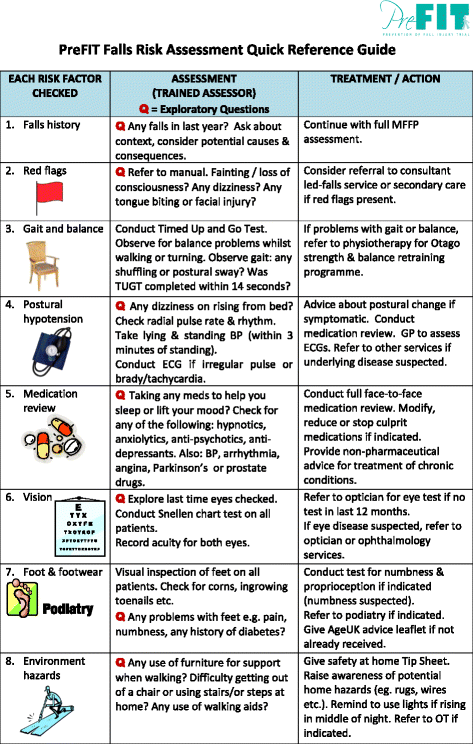The 5-Second Trick For Dementia Fall Risk
The 5-Second Trick For Dementia Fall Risk
Blog Article
The Only Guide for Dementia Fall Risk
Table of ContentsGet This Report about Dementia Fall RiskMore About Dementia Fall RiskDementia Fall Risk - An OverviewDementia Fall Risk - QuestionsThe Basic Principles Of Dementia Fall Risk
In the community, poor road lighting or unsafe creeks and garbage dumps might additionally create accidents. Falls Risk Assessment Tool (FRAT) is a 4-item falls-risk screening tool for sub-acute and residential treatment. The FRAT has three sections: drop danger status, threat element list, and action strategy. A Loss Threat Condition includes data regarding background of current falls, medications, psychological and cognitive status of the person.If the person scores on a risk variable, the matching number of points are counted to the patient's autumn risk rating in the box to the much right. If an individual's fall risk rating completes 5 or greater, the individual is at high threat for falls. If the person ratings just four factors or lower, they are still at some danger of falling, and the registered nurse must utilize their finest professional analysis to take care of all loss risk variables as component of an all natural treatment plan.
These conventional techniques, in basic, help develop a safe atmosphere that lowers unintentional drops and delineates core preventative measures for all clients. Signs are vital for patients at danger for drops.
What Does Dementia Fall Risk Do?
Wristbands should consist of the person's last and first name, date of birth, and NHS number in the UK. Details need to be printed/written in black versus a white background. Just red color needs to be utilized to signify special individual status. These recommendations follow present advancements in patient identification (Sevdalis et al., 2009).
Items that are as well far might need the patient to connect or ambulate needlessly and can possibly be a danger or add to falls. Aids stop the individual from going out of bed with no aid. Nurses react to fallers' call lights quicker than they do to lights initiated by non-fallers.
Aesthetic problems can considerably create falls. Hip pads, when worn effectively, may reduce a hip fracture when loss happens. Maintaining the beds closer to the flooring minimizes the threat of drops and serious injury. Positioning the bed mattress on the floor significantly reduces fall threat in some healthcare settings. Reduced beds are created to minimize the distance a person drops after relocating out of bed.
The Definitive Guide to Dementia Fall Risk
Patients who are tall and with weak leg muscle mass who try to rest on the bed from a standing setting are most likely to drop onto the bed since it's also low for them to decrease themselves securely. If a tall person attempts to obtain up from a low bed without help, the client is likely more information to fall back down onto the bed or miss out on the bed and drop onto the floor.
They're created to promote timely rescue, not to prevent drops from bed. Distinct alarms can also advise the person not to stand up alone. Making use of alarms can likewise be a replacement for physical restraints. Besides bed alarm systems, raised guidance for risky people also may help prevent falls.

Clients with a shuffling gait increase loss possibilities drastically. To minimize autumn risk, shoes need to be with a little to no heel, slim soles with slip-resistant walk, and support the ankle joints. Encourage patient to make use of nonskid socks to stop the feet from moving upon standing. Nonetheless, encourage clients to put on appropriate, well-fitting shoesnot nonskid socks for motion.
6 Simple Techniques For Dementia Fall Risk
Individuals, specifically older grownups, have actually reduced aesthetic capability. Illumination an unknown environment assists boost presence if the patient must get up at evening. In a research study, homes with appropriate illumination report fewer falls (Ramulu et al., 2021). Enhancement in lights at home may reduce loss rates in older grownups (Dementia Fall Risk). Making use of stride belts by all healthcare suppliers can promote safety and security when helping clients with transfers from bed to chair.

Sitters work for assuring a secure, safeguarded, and risk-free setting. Research studies showed very low-certainty evidence that caretakers reduce autumn danger in acute care health centers and just moderate-certainty that choices like video clip monitoring can reduce caretaker use without boosting fall threat, suggesting that caretakers are not as helpful as originally believed (Greely et al., 2020).
Dementia Fall Risk Things To Know Before You Get This

Raised physical conditioning minimizes the danger for drops and limits injury that is suffered when fall takes place. Land and water-based exercise programs might be similarly helpful on balance and stride and thereby reduce the risk for drops. Water workout Website might contribute a favorable benefit on equilibrium and gait for females 65 years and older.
Chair Surge Workout is a straightforward sit-to-stand workout that aids strengthen the muscular tissues in the thighs and buttocks and improves wheelchair and independence. The goal is to do Chair Increase exercises without making use of hands as the client ends up being more powerful. See sources area for a detailed instruction on exactly how to execute Chair Increase exercise.
Report this page